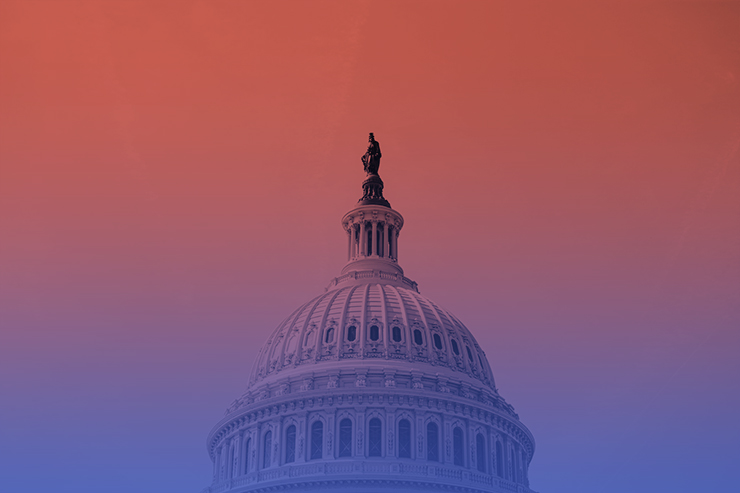The Bipartisan and Bicameral Congressional Push to Rebalance National Security Powers
- October 7, 2021

Introduction
As observers on and off Capitol Hill assess lessons from our two decades in Afghanistan, one of the central takeaways should be the importance of structural reforms to rebalance national security powers. For twenty years, Presidents of both parties failed to implement a realistic strategy for delivering their objectives in Afghanistan and whatever limited Congressional oversight did occur failed to hold the executive branch accountable. A new bipartisan approach in both the U.S. Senate (the National Security Powers Act) and House (the National Security Reforms and Accountability Act) offer important ways forward to restore the proper Constitutional balance of powers that Afghanistan and other recent examples show has been fundamentally out of whack.
Background
The framers of the U.S. Constitution were wary of ceding too much power to the nation’s chief executive, particularly in matters of war and peace. Although the President is the nation’s commander-in-chief, the power to declare war and appropriate funds for military purposes was reserved for Congress. On matters of war and peace, however, our system of checks and balances no longer works. Today, Presidents have extraordinary unilateral authority to wage war, declare emergencies, and sell dangerous weapons. With respect to national security matters, Congress has, at best, reduced itself to the role of junior partner.
As then-Senator Joe Biden wrote in 1988, “[The] presidential power to use force in the absence of statutory authorization derives from the concept of emergency: the need to repel an attack on the United States or its forces, to forestall an imminent attack, or to rescue United States citizens whose lives are imperiled. Conversely, any policy involving a sustained use of force must derive from an affirmative decision of the entire government, including Congress.”
Consider that Congress has never halted or reversed a unilateral presidential action on these matters: For a variety of reasons—some of them Congress’s own doing—the people’s representatives are no longer a meaningful check on the power of the president on national security matters. Congress’s failure to check the Executive Branch has resulted in the perverse situation in which the president can make war unilaterally, declare emergencies in perpetuity, and sell weapons indiscriminately. And the legislative branch has been unwilling or unable to do anything about it.
Even when strong bipartisan majorities in Congress vote against a war, nothing changes. Bipartisan majorities in Congress have voted to end wars, revoke emergency powers, and block arms sales. But in reality, it requires a two-thirds majority in both chambers to override a guaranteed presidential veto. In 2019 and 2020, Congress tried with bipartisan majorities to overrule Presidential action on arms sales, war powers, and national emergencies nine times, and was vetoed every time.
Definition of hostilities makes clear that virtually all military actions would require Congressional approval. Both bills define hostilities clearly and with enough breadth to include virtually all military actions, removing one of the ways presidents have routinely dodged congressional authorization. Among many other examples, the Obama administration’s 2011 intervention in Libya would have without doubt required congressional authorization if the NSPA/NSRAA framework had been law at the time.
The National Security Powers Act and the National Security Reforms and Accountability Act
The recent bipartisan introductions of the National Security Powers Act (NSPA) in the U.S. Senate and the National Security Reforms and Accountability Act (NSRAA) in the U.S. House represent a watershed moment. The NSPA, introduced by Senators Mike Lee (R-UT), Chris Murphy (D-CT), and Bernie Sanders (I-VT) in July and the NSRAA, introduced by Reps. Jim McGovern (D-MA) and Peter Meijer (R-MI) in the House in September, with original co-sponsor Reps. Peter DeFazio (D-OR), Nancy Mace (R-SC), Barbara Lee (D-CA), Joaquin Castro (D-TX), and Ted Lieu (D-CA), would give the people’s representatives in Congress more of a say on national security issues and restore the proper balance of powers.
- Senator Murphy stated, “Why did the Founding Fathers give Congress, and not the executive branch, the power to declare war? Because there’s nothing more serious than sending our soldiers, our troops, our brave men and women into battle at risk of death. And our Founding Fathers knew that that was a question that needed to be debated throughout the entire country by the American public, not a decision that should be made by one person.
- Senator Lee said, “Presidents of both parties have usurped Congress’s prerogative to determine if, when, and how we go to war. Now America’s global standing, treasure, and brave service members are being lost in conflicts the people’s legislators never debated.”
- Senator Sanders noted, “Article I of the Constitution clearly states that it is Congress, not the president, which has the power to declare war. The Framers gave that power to Congress, the branch most accountable to the people, but over many years Congress has allowed its oversight authority to wane and executive power to expand. This legislation is an important step toward reasserting that constitutional power.”
- Rep. McGovern stated: “For decades, presidents of both parties have slowly but surely usurped Congressional authority on matters of national security. It’s happened regardless of who occupies the Oval Office or which party is in charge on Capitol Hill. Clearly, this is not the system of checks and balances our constitution envisions. Congress is the branch of government closest to the people and it is our duty to make tough decisions about when, where, and how to put American troops in harm’s way.”
- Rep. Meijer said: “Allowing administration after administration – presidents from both sides of the aisle – to supersede Congress’s authority over matters of war and peace is a dereliction of congressional responsibility.”
The NPSA and NSRAA Approach – Flipping the Script
The NSPA and NSRAA seek to restore the balance of power between the two branches in matters of war and peace by flipping the script. Under the new dynamic, presidents wishing to initiate military action, assume powers by declaring a national emergency, or sell arms abroad will only be able to exercise these powers without affirmative Congressional approval for a limited period. Authority or funding will automatically cut off if Congress does not give its explicit statutory approval.
Take the example of Afghanistan. The NSPA and NSRAA would have ensured a periodic debate over reauthorization and that the public and Congress remained engaged in these debates. Members of Congress owe it to U.S. forces in combat and to the American people to take an active role in overseeing America’s wars.
The reforms advanced by this legislation will mean that presidents no longer have the luxury of ignoring Congress when considering military action, declaring or prolonging a national emergency, or authorizing an arms sale. And members of Congress that support a president’s decision to initiate military action, invoke emergency powers, or proceed with an arms sale must make that position clear to their constituents through a recorded vote.
The legislation is divided into three sections – war powers reform, arms export reform, and national emergencies reform – all unified by structural reforms that reassert congressional prerogatives and the Constitutional balance between the executive and legislative branches:
War Powers Reform
- Flipping the Script: In a limited set of emergency circumstances, presidents may initiate military action without obtaining prior authorization. However, funding for any military action initiated by the president will be automatically terminated after 20 days unless Congressional authorization is obtained, a period which can be extended only to a maximum of 30 days.
- No more zombie AUMFs: Use of force authorizations must be reauthorized every two years.
- Closing the Article II Loophole: Limit the ability of Presidents to circumvent Congress by claiming an action doesn’t rise to the level of requiring congressional authorization or is supported by the executive’s Article II powers.
National Emergencies Reform
- Flipping the Script: Unless Congressional authorization is obtained, a president’s authority to exercise emergency powers pursuant to an emergency declaration will automatically terminate within 30 days.
- Limiting the scope: National emergency powers must be directly related to the declared emergency.
- No more “permanent emergencies”: Emergency declarations must be reapproved each year and must have a maximum duration of five years.
Foreign Arms Sales Reform
- Flipping the Script: Foreign arms sales above a particular threshold must now be approved by Congress to proceed, ending the de facto requirement that Congress muster a veto-proof majority to halt an arms sale.
- Support for NATO and allies: The presumption of approval would remain for NATO allies and key defense partners.
The NSPA and NSRAA are similar, addressing structural reforms to rebalance national security powers and relying on the same three sections. Minor differences are primarily in the war powers reform section and the national emergencies reform section. For example, the House version does not include the sunsetting of any of the AUMFs currently in force, as there is a pre-existing set of bills in the House that address those, while the Senate version sunsets all current AUMFs in six months. And the House version also includes a specific provision for judicial review of any presidential violations of the war powers requirements.
Prospects for Structural Reform Have Never Been Better
The approach embodied by the NSPA and NSRAA has been greeted positively by a cross-ideological array of organizations – see this statement of support signed by 23 different organizations across the political and ideological spectrum in support of the Senate bill: American Civil Liberties Union (ACLU); Brennan Center for Justice at NYU Law School; Center for American Progress; Center for Civilians in Conflict (CIVIC); Center for International Policy; Common Defense; Concerned Veterans for Americans; Demand Progress; Foreign Policy for America; FreedomWorks; Friends Committee on National Legislation; International Crisis Group; Indivisible; Niskanen Center; Open Society Policy Center; Oxfam America; Project on Government Oversight; Protect Democracy; Public Citizen; Quincy Institute for Responsible Statecraft; R Street Institute; VoteVets; and Win Without War. Support for the House legislation is similarly broad and cross-ideological – see a quote sheet endorsing the NSRAA from 17 organizations here.
There are encouraging signs that the Biden Administration will support reasonable reforms. Historically, attempts to recalibrate the dynamic between Congress and the Executive Branch on matters of national security have been unsuccessful due to White House opposition. Presidents of both parties have been reluctant to support reforms that would diminish the scope of their unilateral authority, and even presidents that supported reform before entering the White House have stymied efforts to give Congress a more meaningful role.
Yet as former House Majority Leader Dick Gephardt and former Senator Gary Hart recently wrote in support of the NSPA, “The bill would be the most important recalibration of the balance of power between the president and Congress in decades. Notably, it adopts many ideas that then-Sen. Joe Biden advocated in the 1980s.” President Biden, a long-time defender of Congress’s role in matters of national security during his years in the Senate, already endorsed efforts earlier this year to repeal and replace outdated authorizations of military force with more narrowly tailored measures. The White House has not yet announced its position on the NSPA of NSRAA, but the White House has signaled an openness to reforms aimed at reasserting congressional war powers.
Conclusion
Congress should reclaim its constitutional role on matters of war and peace. The bipartisan NSPA and NSRAA would ensure that the people’s elected representatives, once again, have a real voice.To learn more, contact Soren Dayton at [email protected] or Ken Gude at [email protected].
Related Content
It can happen here.
We can stop it.
Defeating authoritarianism is going to take all of us. Everyone and every institution has a role to play. Together, we can protect democracy.
Donate
Sign Up for Updates Sign Up for Updates
Explore Careers Explore Careers
How to Protect Democracy How to Protect Democracy
